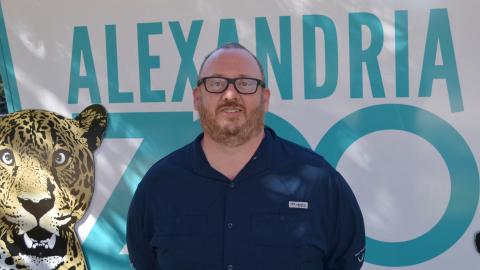Dr. Max Lakes Named Director of Alexandria Zoo
Alexandria, La. (November 17, 2020) — Dr. Max Lakes, Ed.D. M.S., has been named the Director of the Alexandria Zoo. Lakes takes over for Lee Ann Whitt, who recently retired after 32 years with the Alexandria Zoo.
“I’m honored and humbled to be part of the staff here,” Lakes said. “You already have world-class animal care here. That’s the thing about AZA accredited zoos, you have all of the same standards as the big zoos like San Diego, Disney, Audubon and Columbus. I’m looking forward to learning what the community wants, what the city wants and working to meet those needs.”
“We are very pleased to have Dr. Lakes join our team,” said Alexandria Mayor Jeffrey W. Hall. “He definitely has his work cut out for him. Lee Ann set the bar very high, and we expect the Alexandria Zoo to continue to be one of the finest small zoos in the country. I’m confident Dr. Lakes has the experience, skills and knowledge to continue and build on the great tradition of excellence we have at the Alexandria Zoo.”
A native of Lexington, Kentucky, Lakes grew up in the Cincinnati, Ohio, area. He comes to Alexandria from the Lee Richardson Zoo in Garden City, Kansas, where he served as deputy director. Lakes has also worked at the Sedgwick County Zoo in Wichita, Kansas, as well as the Columbus Zoo in Columbus, Ohio. He started working as an education curator and has extensive experience doing research of visitor interaction with zoo facilities.
“I didn’t start out with being a director as part of the plan, but I have been in management most of my career,” Lakes said. “I’ve always loved the South. I have family in the Pensacola/Mobile area, so I am very excited about being here in Alexandria.”
One of Lakes’ first priorities will be getting the zoo repaired from damage caused by Hurricanes Laura and Delta. Several areas were heavily damaged by the storms including habitats for the cougar, maned wolf, Chinese alligator, cassowary, and several other Australian species. The zoo’s cougars, Jack and Diane, are currently housed at the Baton Rouge Zoo until their home is repaired.
“One of the things I have noticed here is the great habitat usage by animals,” Lakes said. “Some places you’ll see a huge habitat, but the animals only use 15 percent of it. Here I’m seeing animals making maximum use of the habitat thanks to the design and enrichment activities. That’s a testament to the work of (Zoo Curator) Lisa Laskoski and her team.”
As Lakes begins his new role he said he “looks at this as a new relationship. I have to learn and then move forward with what guests want. I am a firm believer in getting lots of opinions.”

